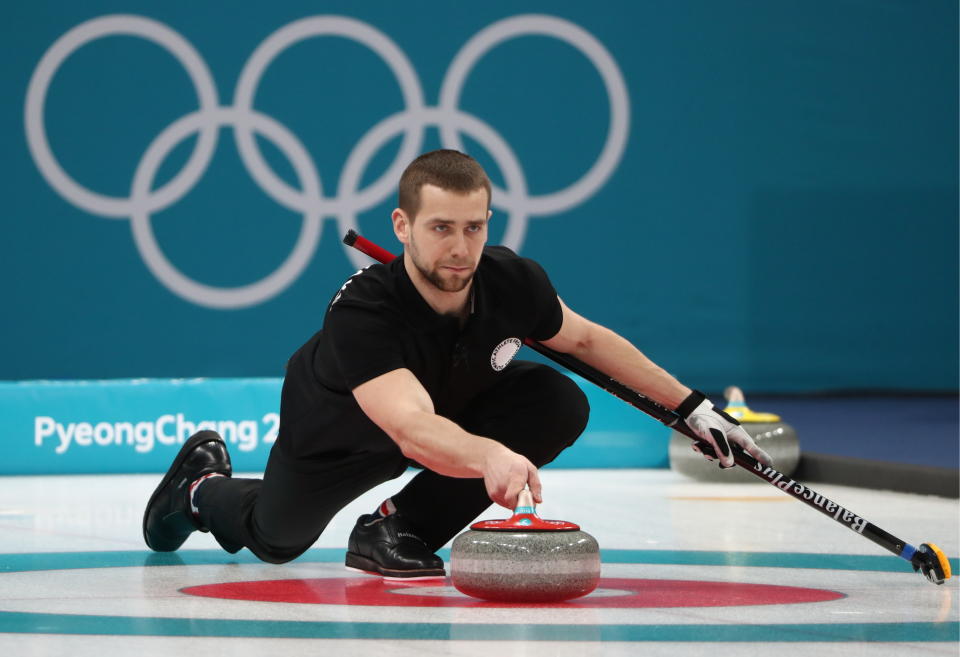Russia opens criminal investigation to find someone else to blame for curler's doping
A Russian athlete was charged with doping. Now comes the fun part.
We’ve seen this movie before. We’ve seen it all too often. But on the umpteenth run, it’s no less entertaining.
A Russian athlete was accused of doping, and now we get to watch Russian officials and fans stumble over themselves in search of a defense; in search of a justification; in search of someone else to blame. We get to watch them stretch to absurd lengths to paint themselves not as the culprits, but as the victims. Their relentlessness would almost be admirable
Alexander Krushelnitsky, an Olympic curling bronze medalist from Russia, was formally charged on Monday after testing positive for meldonium. On Tuesday, his B-sample confirmed the presence of the substance in his system.
Also on Tuesday, the Olympic Athletes from Russia delegation announced that the Russian Olympic Committee had “initiated a comprehensive investigation of the circumstances.” Oh, and that includes a “criminal investigation under the Russian Federation criminal law.”
Yep. Seriously. Russia has launched a criminal investigation to “establish the facts of the case in detail,” and seemingly to find who was responsible for another man’s doping, because it’s absolutely preposterous to even suggest that one of its athletes would actually have willingly taken a banned drug.

“It’s obvious that in this particular case, the athlete could not have intentionally used a prohibited substance,” Russian sports minister Pavel Kolobkov said Tuesday, without giving any evidence for why the athlete could not have intentionally use a prohibited substance.
“It just does not make any sense,” he said, resorting to feigned confusion as the feeblest form of defense.
The official statement from the Olympic Athletes of Russia delegation provided a bit more clarity on what exactly Russia’s argument is. It’s not based on any proof. But it’s not completely illogical either.
Their analysis – which they claim to be “unbiased,” thought it’s obviously not – suggests Krushelnitsky’s test results were “indicative of taking [meldonium] once.” Their statement claimed that Krushelnitsky had tested clean on Jan. 22.
This, the statement read, “is not applied in medical practice and is absolutely useless and ineffective in the context of enhancing physical performance or sports results. No evidence of the systematic usage of meldonium is available in this particular case.”
So, do they have a point? Maybe. Seriously … they might!
But might it make more sense to let the IOC and CAS – which have, by the way, largely sided with Russia over the integrity of sport in the past – “establish the facts of the case” themselves? Perhaps.
Especially since it’s clear that Russia planned to mount some sort of defense from the minute the news broke, regardless of the facts of the case. A Wall Street Journal report, also echoed by others, read: “Because the dose of meldonium detected in Krushelnitckii’s urine sample was significantly higher than what would normally be read for a person treated with the drug, authorities are exploring the possibility that he was the victim of an act of sabotage.”
Russian media reports that the Russian Olympic Committee is "looking at different lines of defense" of the curler accused of doping. Those lines include things like "sabotage" and "doping terrorism." Never accuse Russians of not learning their lessons, folks.
— Slava Malamud (@SlavaMalamud) February 20, 2018
All of which suggests that maybe there’s no merit behind this “criminal investigation” after all, with the only purpose being to paint themselves as victims and re-assign blame, like they’ve done all along.
More Olympics on Yahoo Sports:
• Korean speed skaters accused of bullying after leaving teammate in tears
• Japanese ski jumper, 45, vows to return at 2022 Winter Olympics
• Wetzel: North Korean speed skater has eventful but unsuccessful night
• Germany-Switzerland featured an ejection nine seconds into game
• Busbee: Christie’s run of bad luck at Olympics continues in 1,000m



